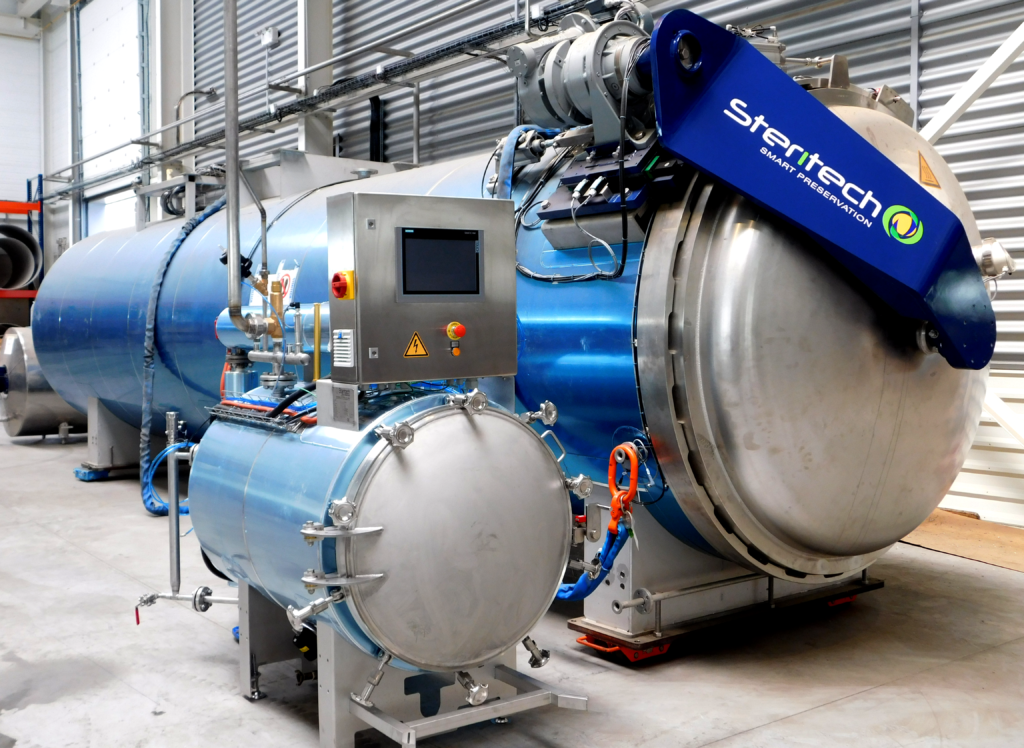6 tips to choose a food autoclave 📋

6 tips for choosing an autoclave for food sterilization
An industrial food autoclave is needed to sterilize and pasteurize food to extend its shelf life. A wide range of food autoclaves is available. They come in different sizes, depending on your needs. You can also choose how your food is sterilized: by water spray, air steam or bi-process. So, what are the best tips for choosing an autoclave for food sterilization? Discover 6 tips to help you choose the right industrial autoclave.
List of requirements for using a can sterilizer in the industry
Can sterilization has revolutionized the food industry. However, the way food is preserved differs depending on whether it is produced domestically, industrially, or in an artisanal way.
What are the safety requirements for an autoclave designed for industrial food sterilization?
Autoclaves must be tested periodically. The specified interval for periodic testing must not exceed one year. Depending on how often the autoclave is used, it is legally necessary to carry out periodic checks at least once a year. Autoclaves must be inspected to avoid any risk of explosion.
Sterilization equipment for artisanal and industrial production
If your jars are intended for sale, a stainless steel autoclave is essential. It enables you to sterilize and preserve your food in all types of packaging: plastic, aluminum trays, glass jars, cans, flexible bags and so on. The autoclave’s temperature and pressure are regulated to ensure food safety and optimum product quality.
List of frequently asked questions when choosing an autoclave for food sterilization
Choosing a food autoclave is no easy task. It’s all about identifying your needs. Start by asking yourself the right questions.
- How much space do I have to install the food autoclave?
- What energy and resources do I need to operate the autoclave?
- What type of heating do I need?
- What is the canning capacity?
- What are the requirements in terms of sterilization cycle and pasteurization cycle?
- What are the product and packaging contrasts?
- What temperature and pressure values are required for sterilization?
- What insulation assistance does the supplier offer after the autoclave has been purchased?
- What is the availability of spare parts for the product?
- Finally, how much does an autoclave for food sterilization cost?
1. Choose an autoclave for food sterilization based on its capacity
On the market, some autoclaves for food sterilization are intended for industrial processes. These autoclaves operate with a mixture of water and steam. They are therefore large. Maximum sterilization temperatures can reach 140°C.
If you are looking for an artisanal production, there are three types of autoclaves for food sterilization. They are defined by their capacity in liters and by the number of jars required for the production.
- Vertical autoclave for food sterilization: food can be cooked and sterilized either by immersion in water, or by spraying with water.
- Horizontal autoclave for food sterilization: the Goût’stave autoclave is the perfect example. You can load either one or two baskets.
- Desktop autoclave for food sterilization: their capacity is lower, due to their smaller size.
2. Choose your food sterilization autoclave according to the products to be sterilized
An autoclave will provide your sterilized food with unrivaled food safety. Pathogenic micro-organisms and other bacteria are inactivated, while the nutritional qualities of the product are preserved. Autoclaves also enable you to cook your food at the same time as it is sterilized. The choice of food autoclave also depends on the type of container to be sterilized: cans, glass jars, aluminum trays or flexible packaging.
3. Choose a sterilizer based on the sterilization process required
The autoclave you choose should be fitted with a temperature probe. This probe measures the core temperature and calculates the sterilizing (VS) or pasteurizing (VP) values applied to a product sample. The production process can be monitored during sterilization cycles.
4. Autoclave safety regarding temperature and pressure
Autoclaves for food sterilization are sterilizers that must be equipped with safety features such as:
- water level and pressure sensors;
- lid or door locking and thermal protection;
- insulation of the entire heat tank;
- water level indicator;
- pressure gauge and piezoelectric pressure sensor;
- safety valve.
5. Support and spare parts for a food sterilization autoclave
Autoclaves are sterilizers that require maintenance over time. Even if sterilizers are subject to periodic maintenance, it may be worthwhile for the supplier to provide high-quality technical assistance on machines and equipment. This can be useful in the event of machine failure.
6. The price of a food sterilization autoclave: an essential criterion
Price is a decisive selection criterion for an industrial autoclave. It includes the purchase price and operating costs. The choice of product depends essentially on the budget available for the purchase. It also depends on the technical characteristics required in terms of sterilization, temperature and pressure.
Looking for a food sterilization autoclave? Take a look at our range of autoclaves made in France.